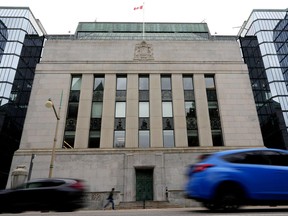
Article content
The slowing pace of decline in gasoline prices was the biggest contributor to Canada’s inflation rate rising to 1.9 per cent in August, Statistics Canada said Tuesday, while lower prices for travel tours and fresh fruit balanced acceleration in the all-items consumer price index (CPI).
THIS CONTENT IS RESERVED FOR SUBSCRIBERS ONLY
Subscribe now to read the latest news in your city and across Canada.
- Exclusive articles from Barbara Shecter, Joe O'Connor, Gabriel Friedman, and others.
- Daily content from Financial Times, the world's leading global business publication.
- Unlimited online access to read articles from Financial Post, National Post and 15 news sites across Canada with one account.
- National Post ePaper, an electronic replica of the print edition to view on any device, share and comment on.
- Daily puzzles, including the New York Times Crossword.
SUBSCRIBE TO UNLOCK MORE ARTICLES
Subscribe now to read the latest news in your city and across Canada.
- Exclusive articles from Barbara Shecter, Joe O'Connor, Gabriel Friedman and others.
- Daily content from Financial Times, the world's leading global business publication.
- Unlimited online access to read articles from Financial Post, National Post and 15 news sites across Canada with one account.
- National Post ePaper, an electronic replica of the print edition to view on any device, share and comment on.
- Daily puzzles, including the New York Times Crossword.
REGISTER / SIGN IN TO UNLOCK MORE ARTICLES
Create an account or sign in to continue with your reading experience.
- Access articles from across Canada with one account.
- Share your thoughts and join the conversation in the comments.
- Enjoy additional articles per month.
- Get email updates from your favourite authors.
THIS ARTICLE IS FREE TO READ REGISTER TO UNLOCK.
Create an account or sign in to continue with your reading experience.
- Access articles from across Canada with one account
- Share your thoughts and join the conversation in the comments
- Enjoy additional articles per month
- Get email updates from your favourite authors
Sign In or Create an Account
or
Article content
Excluding food and energy, CPI rose by 2.4 per cent in August, down from 2.5 per cent in May, June and July.
Article content
Article content
Article content
Here’s what economists think about the latest inflation numbers and their impact on the Bank of Canada’s next interest rate announcement on Sept. 17.
Article content
By signing up you consent to receive the above newsletter from Postmedia Network Inc.
Article content
CPI ‘didn’t matter, but didn’t hurt either’: Scotiabank
Article content
“First, ignore headline CPI,” Derek Holt, vice president and head of capital markets economics at Bank of Nova Scotia, said in a note.
Article content
He said the elimination of the consumer carbon tax earlier this year distorted the measure and will depress year-over-year headline CPI numbers until next spring, “when it should bounce higher once the data starts comparing to a year-ago starting point after April’s carbon tax change.”
Article content
Holt said August’s core inflation numbers “cemented” a rate cut by the Bank of Canada on Wednesday, but that wasn’t always the case. Until the beginning of September, markets spent the year “trapped in a cycle of pushing out cut expectations and getting disappointed in serial fashion,” he wrote.
Article content
Holt said the facts changed “relatively recently,” motivating Scotiabank to alter its long-held call that the central bank would pause rates.
Article content
“Reciprocal tariffs are gone. The U.S. job market dramatically weakened, including massive downward revisions that raise doubts about U.S. resilience and what it means to Canada’s economy. The Canadian job market suddenly began souring. GDP disappointed despite strength in the domestic economy and tracking for Q3 GDP is looking soft, which adds to modest slack,” Holt wrote.
Article content
Article content
Article content
‘No ninth-inning drama here’: BMO Economics
Article content
The latest report was “mostly a low-drama affair,” Douglas Porter, chief economist at BMO Capital Markets, said in a note, with major measures of inflation rising a “tame” 0.2 per cent or less on a seasonally adjusted basis.
Article content
“That pace won’t cause the Bank of Canada much stress, thus keeping them on track for a rate cut at tomorrow’s decision. The milder underlying short-term trends in core, alongside the recent weakening in employment, set the table for further rate relief down the line.”
Article content
Porter said gasoline costs are “less friendly” as they fell 12.7 per cent year-over-year in August compared to a 16.1 per cent drop in July, but noted that pump prices have since moved higher and will “juice” headline inflation well above two per cent next month.
Article content
Rent remains “the single biggest driver of overall inflation,” he said, although it has cooled from 5.1 per cent to 4.5 per cent year-over-year and “seems headed lower.”
Article content
On the trade war front, Porter said goods excluding energy and groceries “eased a tad” to a 1.7 per cent year-over-year pace compared to two per cent in July.

.jpg) 1 hour ago
3
1 hour ago
3
 English (US)
English (US)